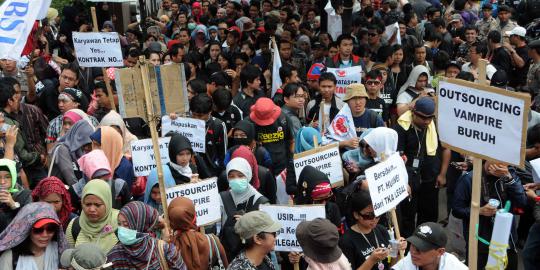Outsourcing has been a significant part of Indonesia's labor market for decades, but recent government plans suggest a shift in policy.
The Indonesian Minister of Manpower, Yassierli, has revealed plans to abolish outsourcing, aiming to address concerns from labor unions and workers.
President Prabowo Subianto supports this decision, signaling a government commitment to improving workers' rights, especially for older outsourced workers who face stagnant wages and lack career progression.
Yassierli emphasized that while outsourcing is set to be phased out, the changes will be made realistically, with consultations from the Indonesian Workers' Welfare Council to ensure workers' rights, such as social security, are safeguarded.
To understand the implications of this change, it’s essential to review the history of outsourcing, both globally and in Indonesia.
Global History of Outsourcing: From Cost-Cutting to Mainstream Practice
Outsourcing as a public sector management tool began in the 1980s under the UK Conservative government.
Originally, it was introduced to cut costs, reduce government workforces, and drive competition in public services.
Nicholas Ridley, the former environment secretary, was a key proponent, suggesting that local governments should outsource services to private firms to increase efficiency.
While this led to strong opposition from trade unions, it gradually gained acceptance as a mainstream practice, particularly in public services like education and healthcare.
Despite concerns about wage suppression and service quality, outsourcing became embedded in public sector management worldwide.
Early Development of Outsourcing in Indonesia
In Indonesia, the concept of outsourcing dates back to the Indonesian Civil Code, which allowed businesses to delegate tasks through 'contracts for work'.
However, the modern outsourcing model emerged in the late 1980s, following the Ministry of Trade Decree Number 264/Kp/1989.
This decree allowed garment companies in export processing zones to outsource production tasks to reduce costs and meet export demands.
Initially, outsourcing was limited to the garment industry, but it laid the groundwork for its expansion into other sectors.
Expanding Outsourcing Regulations in the 1990s
In the 1990s, Indonesia began formalizing outsourcing regulations.
The Ministry of Manpower introduced Decree Number SE-08/MEN/1990, which required user companies to provide the same protections and welfare to outsourced workers as to permanent employees.
In 1993, further regulations shifted responsibility for worker welfare from user companies to subcontractors, making subcontractors fully responsible for workers' rights.
The Legal Framework: Law Number 13 of 2003
The 2003 Manpower Law (Law Number 13 of 2003) represented a major shift in Indonesia's outsourcing policies. It expanded the outsourcing model to cover not only subcontracted work but also labor supply across various industries.
The law clarified that the employment relationship was between the subcontractor and the workers, who were entitled to the same rights as permanent employees.
This move effectively legalized outsourcing across multiple sectors, making it a common practice in Indonesia.
Economic Impact and Benefits of Outsourcing
By 2012, outsourcing had become an integral part of Indonesia's labor market, with an estimated 16 million outsourced workers, or about 40% of the workforce.
Outsourcing provided several key benefits to businesses, including:
- Focus on Core Activities: Outsourcing allows companies to concentrate on their main business operations.
- Cost Efficiency: It enables businesses to reduce operational costs.
- Financial Flexibility: Outsourcing provides greater flexibility in workforce management.
- Reduced Labor Management Issues: Companies can avoid the complexities of directly managing outsourced workers, such as layoffs and severance.
The government also benefited from outsourcing, as it was seen as a means of promoting labor market flexibility.
This approach, adopted after the 1997 economic crisis with guidance from the IMF and World Bank, aimed to attract foreign investment and stimulate economic growth.
Outsourcing also facilitated labor mobility, offering workers opportunities for skill development and career progression.
PHOTO: MERDEKA.COM
This article was created with AI assistance.
Read More






 Friday, 27-02-26
Friday, 27-02-26







